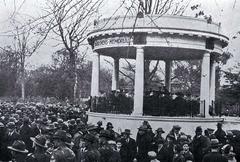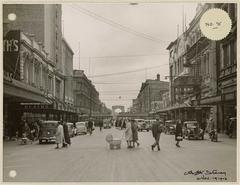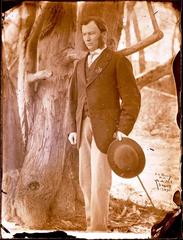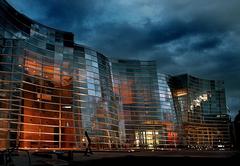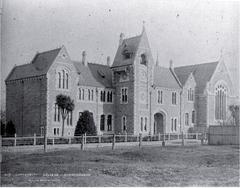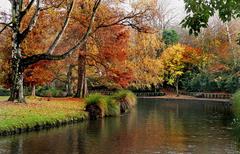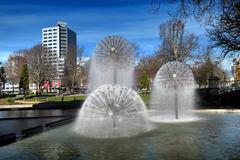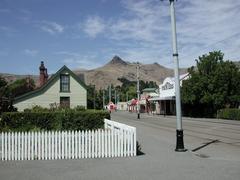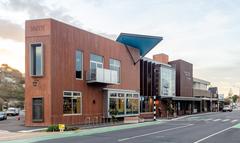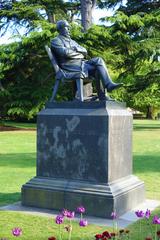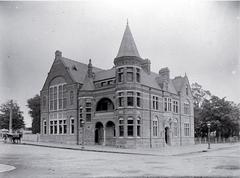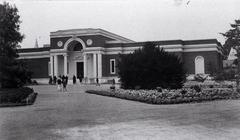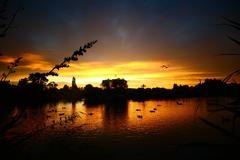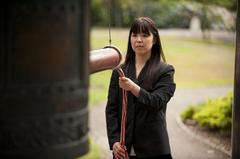Ferrymead Cob Cottage: Visiting Hours, Tickets, and Christchurch Historical Sites Guide
Date: 14/06/2025
Introduction
Ferrymead Cob Cottage, nestled within Christchurch’s Ferrymead Heritage Park, is a rare and evocative relic of New Zealand’s colonial past. Constructed in the early 1860s by Captain James Penfold, this cottage showcases the traditional cob building technique—a blend of clay, sand, straw, and water—demonstrating the resourcefulness and resilience of Canterbury’s early European settlers. Over 150 years later, the cottage endures as one of Christchurch’s last surviving examples of earth construction, offering visitors an immersive window into 19th-century settler life.
This guide provides detailed information on Ferrymead Cob Cottage’s history, architectural and cultural significance, current visiting hours, ticketing, accessibility, travel tips, nearby attractions, preservation challenges, and more. For up-to-date details and planning resources, consult the Ferrymead Heritage Park website and the Christchurch City Council Heritage portal.
Table of Contents
- Introduction
- Historical Background
- Architectural Features and Interpretation
- Cultural, Social, and Archaeological Importance
- Preservation Challenges and Community Engagement
- Visiting Information
- Frequently Asked Questions
- Visuals and Media
- Useful Links and Further Reading
- Conclusion and Call to Action
Historical Background
Origins and Construction
Built in 1862 by Captain James Penfold, the Ferrymead Cob Cottage—initially a simple “sod hut”—was constructed near the Ferrymead steam wharf to house Penfold’s family. The original four-room cottage was crafted from sod blocks cut from the riverbanks, combined with salvaged timbers from the Excelsior, Penfold’s ship. This method, common among settlers facing material shortages, provided insulation and durability suited to Canterbury’s climate (Living Heritage).
Building Techniques: Sod and Cob
The earliest version of the cottage used sod—a mix of turf, soil, and roots—before subsequent repairs and restoration replaced much of the original structure with cob, a more resilient mixture of clay, sand, straw, and water. This transition illustrates evolving colonial building practices and the desire for longevity in heritage preservation (districtplan.ccc.govt.nz).
Decline, Restoration, and Relocation
The Penfold family lived in the cottage until 1908, after which it fell into disrepair. In the 1940s, Ernest Parish and local youth groups spearheaded a community restoration, reconstructing the cottage with cob and reopening it in 1944 as a public memorial to Canterbury’s pioneers. Despite suffering fire damage in 1948 and earthquake impacts in 2010–2011, the cottage has been carefully preserved and is now under the stewardship of the Christchurch City Council and Ferrymead Trust (Living Heritage, districtplan.ccc.govt.nz).
Heritage Status and Community Role
Today, the cottage is a Category 2 historic place with Heritage New Zealand, celebrated as a symbol of settler ingenuity and community resilience. Its preservation is the result of sustained public advocacy, fundraising, and volunteer efforts (Heritage New Zealand).
Architectural Features and Interpretation
Ferrymead Cob Cottage features a single-storey, rectangular plan with thick cob walls (45–60 cm), a simple gabled roof, small-paned windows, and an open hearth fireplace. Original sod courses remain visible beneath later finishes, providing insight into period construction. Inside, interpretive displays and period furnishings evoke daily life in the 1860s, and signage details both original and restored elements (Christchurch City Libraries, districtplan.ccc.govt.nz).
Cultural, Social, and Archaeological Importance
Ferrymead Cob Cottage is a tangible link to the early European settlement of Christchurch. It has served as a home, a community gathering place, and now a public heritage site. Its preservation reflects the city’s commitment to honoring both colonial and indigenous histories, with recent efforts to integrate te ao Māori perspectives into heritage management (Chris Lynch Media).
The site also has archaeological value, with opportunities for research into early settler construction and domestic life. Its proximity to the first public railway in New Zealand, the Ferrymead-Christchurch line, further enhances its historical significance (explorechristchurch.nz).
Preservation Challenges and Community Engagement
Despite its enduring presence, the Cob Cottage faces ongoing challenges:
- Earthquake Damage: The 2011 earthquakes caused significant structural harm, necessitating emergency stabilization and delaying full restoration due to funding constraints (NZ Herald).
- Heritage vs. Safety: Balancing historical authenticity with visitor safety has prompted debate, particularly regarding the removal or modification of fragile features (Chris Lynch Media).
- Volunteer Reliance: The park’s ongoing operations depend heavily on dedicated volunteers and community organizations, emphasizing the importance of public involvement (U3A South West Christchurch).
- Funding and Prioritization: Limited resources and competing infrastructure repairs can slow preservation progress (NZ Herald).
Visiting Information
Hours
- General Opening: Wednesday to Sunday, 10:00 am – 4:30 pm.
- Public Holidays: Open; check for special hours.
- Closed: Christmas Day and New Year’s Day.
- Note: The Cob Cottage’s interior may have restricted access due to preservation needs; the exterior is always viewable during park hours.
- Check Updates: Ferrymead Heritage Park website.
Tickets
- Adults: NZD $15–$20
- Children (5–15): NZD $8–$10
- Family Pass: NZD $40–$50 (2 adults + 2–3 children)
- Under 5s: Free
- Discounts: Available for seniors, students, and groups.
- Where to Buy: Online (Ferrymead ticketing), or at the entrance.
Accessibility
- Main Park: Wheelchair accessible with paved paths.
- Cob Cottage: Main floor generally accessible; attic and some areas may have limited access due to historic features.
- Contact Ahead: For specific needs, contact Accessibility Info.
Travel Tips
- Getting There: 50 Ferrymead Park Drive, Heathcote, Christchurch (approx. 7 km from city centre; Google Maps).
- Parking: Ample free parking.
- Public Transport: Several bus routes connect the city centre to Ferrymead.
- Facilities: On-site café, gift shop, picnic areas, playgrounds, restrooms, and baby-changing facilities.
- Dress: Comfortable shoes; bring layers for changing weather.
Facilities
- Guided Tours: Regular guided walks and special tours available; check schedules (Ferrymead Heritage Park Visitor Info).
- Educational Programs: School holiday programs, heritage festivals, and hands-on demonstrations.
- Photography: Permitted without flash or tripods to protect interiors.
Nearby Attractions
- Christchurch Gondola
- Sumner Beach
- Heathcote Valley
- Ferrymead Railway and Vintage Tram Rides
- Christchurch Tramway Museum
Frequently Asked Questions
Q: What are the Ferrymead Cob Cottage visiting hours?
A: Wednesday to Sunday, 10:00 am–4:30 pm; check the official website for updates.
Q: How much are tickets?
A: Adults NZD $15–$20, children NZD $8–$10, family passes NZD $40–$50. Under 5s free.
Q: Is the cottage wheelchair accessible?
A: The main floor is generally accessible; some areas are restricted.
Q: Are guided tours available?
A: Yes, regular and special tours are offered.
Q: Can I take photos inside?
A: Yes, without flash or tripods.
Q: Are pets allowed?
A: Only service animals.
Visuals and Media
High-quality images, videos, and virtual tours of the cob cottage and the wider park are available on the Ferrymead Heritage Park website. Images are tagged for accessibility and SEO with phrases such as “Ferrymead Cob Cottage Christchurch historical site” and “Ferrymead Heritage Park tours.”
Useful Links and Further Reading
- Ferrymead Heritage Park Official Website
- Christchurch City Council Heritage
- Living Heritage - Sod Cottage
- District Plan - Statement of Significance
- Explore Christchurch - Ferrymead Heritage Park
- Heritage New Zealand
- Chris Lynch Media - Heritage Issues
- NZ Herald - Cob Cottage Restoration
Conclusion and Call to Action
Ferrymead Cob Cottage is a unique Christchurch historical site, offering a vivid glimpse into New Zealand’s colonial past. Its enduring presence, authentic architecture, and engaging visitor programs make it a must-see destination for history enthusiasts, families, and travelers alike. For the latest updates on visiting hours, ticket offers, events, and restoration news, visit the Ferrymead Heritage Park website, and consider downloading the Audiala app for enhanced tours and exclusive content.
By supporting and visiting Ferrymead Cob Cottage, you help ensure that this remarkable piece of New Zealand’s heritage is preserved and appreciated by generations to come.
Sources:
- Living Heritage - Sod Cottage
- District Plan - Statement of Significance
- Ferrymead Heritage Park Official Website
- Chris Lynch Media - Heritage Issues
- NZ Herald - Cob Cottage Restoration
- Explore Christchurch - Ferrymead Heritage Park
- Heritage New Zealand
- Christchurch City Libraries
- Christchurch City Council Heritage
- U3A South West Christchurch
